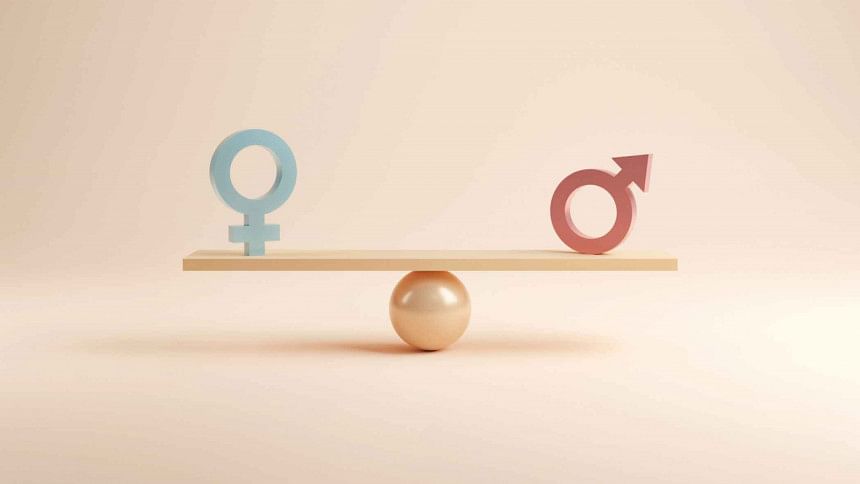More chores for women further tilts the gender gap

"My husband says not to look for work too far from home since I have to do the household work as well and asks me to wait." Mita (not her real name) went on to express her frustration by saying, "If this pandemic hadn't arisen, I would have surplus money to spend on my kids, I would've had a job." Mita is a 32-year-old former garments factory worker whom we interviewed as part of a project to understand the gendered experience of Covid-19 in Bangladesh. Mita left her job during the pandemic, and when she did start looking for jobs again, she had much fewer options because of her husband's specific instructions.
A harsh fact of the pandemic is that it did not affect all groups of society equally. Women lost out on growth and employment opportunities because they are having to shoulder the heavier share of the domestic burden.
With the closure of public and private educational institutes, offices and transportation at different times during the pandemic, the labour market was disrupted for all. However, the pandemic induced an economic downturn which imposed a double burden for women.
In Bangladesh, nearly 31 percent of the informal workforce has female employees. People who worked in informal sectors lost their jobs without any prior notice and were the most impacted. Multiple studies from around the globe indicated women's careers were adversely affected even if they were able to retain their jobs and there was a trend of women decreasing their work hours during the pandemic.
We hoped, seeing how stressful household responsibilities are first hand, being exposed to the full extent of it—men would begin to do their fair share. But they continued letting the women of the house pick up their slack. As a result, household responsibilities increased more for women compared to pre-lockdown. To explore this, we interviewed 28 female respondents and 12 male respondents in Bangladesh asking about specific effects of Covid-19 on their household responsibilities and whether there was a gendered dimension to these impacts. We found three recurring themes.
The first, families in patriarchal societies have unequal distribution of labour, with the majority of the women having double the work pressure within the household compared to men. For example, Yamin Begum, a 41-year-old housemaid, mentioned increased household workload during Covid by saying: "Yes, during the lockdown the work pressure increased. I had to boil water several times a day. I had to keep things clean a lot—with soap and water and made sure everyone washed their hands. I had to make food for everyone as well."
This was not an anomaly as 21 out of 28 of our female respondents stated that the pandemic and the initial lockdown have led to a multitude of challenges for them, including increased household work due to the extra precautions they had to take because of Covid. Even though more family members were staying at home, 16 of our female respondents mentioned that they had no additional help during this time. The other 12 female respondents got additional help from the other family members who are female.
The second theme was the perception of men about household work being less strenuous than their work and the overriding belief that the household chores are an integral part of women's everyday life and should not be considered as a burden. Men typically think household work should be done by women, as they have always seen women spending most of their time taking care of household responsibilities. A 32-year-old tea stall owner from Kallyanpur said: "There is less pressure in housework. My work needs more energy."
The third theme was women themselves preferred for their husbands and sons to not get involved in household chores. Some of our female respondents opined that they are not used to their husband's assistance inside the kitchen or in the regular household chores.
"Have you ever seen men working in the kitchen? Never! Even though now I have a little pressure due to the lockdown, these jobs (cooking, washing, cleaning, and taking care of the house) are my responsibilities. I cannot ask my husband to do this. My mother, my mother-in-law never did this, how can I?" laughed 46-years-old Nasrin, who lives in Agargaon slum in Dhaka city.
Our findings confirmed the notion that women tend to take on more household duties than the men, and that for many women, the lockdown brought on an increased burden of responsibilities. Surprisingly, many women had to put up with this increased workload without any kind of support and that led to their low-income recovery.
Despite our shared sense of gender progress in Bangladesh, lots need to be done to bring gender equality within the household domain. These findings are direct indicators that must sway the policymakers to take into consideration the unfair distribution of domestic labour and the unpaid care labour when drafting policy responses for Covid and future pandemics.
Amal Chowdhury is a research assistant at the Brac James P Grant School of Public Health, Brac University.

 For all latest news, follow The Daily Star's Google News channel.
For all latest news, follow The Daily Star's Google News channel. 








Comments